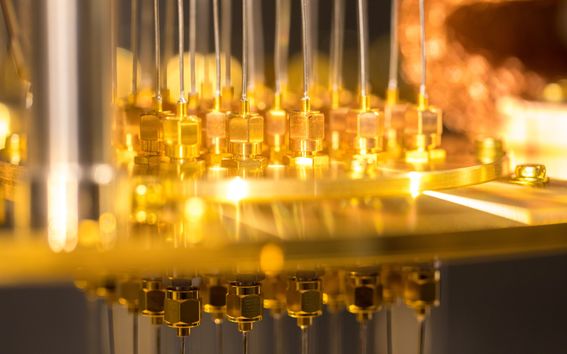A major project brings together Finnish industry and research for quantum technology development

A new research project has been launched to accelerate the progress of Finnish quantum technology. The QuTI project, coordinated by VTT Technical Research Centre of Finland, will develop new components, manufacturing and testing solutions, and algorithms for the needs of quantum technology. The QuTI consortium, partly financed by Business Finland, consists of 12 partners and has a total budget of around EUR 10 million.
Quantum technology is developing into a widespread field in industry. This quantum wave is motivated by the unprecedented performance improvements and paradigm shifts that the utilization of quantum phenomena can provide for computing, communication and sensing applications. The Quantum Technologies Industrial (QuTI) ecosystem project, coordinated by VTT, brings together the expertise of Finnish industry and research organizations to find new quantum technology solutions.
“Quantum technology is a multidisciplinary and rapidly advancing field. The QuTI consortium provides an ideal starting point for strengthening the international competitiveness of Finnish technology and industry in this fast-growing field,” says QuTI project’s coordinator, Professor Mika Prunnila from VTT.
The quantum computing, communication and sensing devices to be developed in the QuTI project are largely based on expertise in microsystems, photonics, electronics and cryogenics. The project develops customized software and algorithms hand in hand with the hardware, strengthening the Finnish quantum computing infrastructure. In addition, new tools will be created for quantum technology product development that will serve the needs of the QuTI project as well as the entire field of quantum technology.
The QuTI project covers the full value chain of quantum industry from materials and hardware to software and system-level solutions. The project involves 12 organizations: the research partners are VTT, Aalto University, Tampere University and CSC – IT Center for Science, and the industrial partners are Bluefors, Afore, Picosun, IQM, Rockley Photonics, Quantastica, Saab, and Vexlum.
Aalto will provide expertise and device development
In this project, Aalto will provide expertise in superconducting circuits and device development. This will allow researchers to more accurately detect microwave fields and temperatures and to perform quantum computing more efficiently.
The project is being run by Senior University Lecturer Sorin Paraoanu. Professor Jukka Pekola of Aalto University and Professor Mikko Möttönen of Aalto University and VTT Technical Research Centre of Finland are also involved.
‘Among other things, we’re developing superconducting quantum processors, quantum algorithms and novel measurement protocols based on quantum effects. Our research will utilise VTT’s expertise in designing and producing samples,’ says Paraoanu.
Pekola’s research group specializes in temperature sensors. The quantum thermometer that the group has been developing for the past 25 years has been used at very low temperatures.
‘Now we’re developing much faster measurement methods. We can obtain the measurement results nearly 1,000 times faster than before,’ he says.
Möttönen’s group focuses on the development of superconducting qubits and highly sensitive detectors. Now the group has opened a postdoc position to work on qubits.
Starting point for the Finnish quantum ecosystem
The three-year QuTI project will be implemented as a jointly funded project that is partly financed by Business Finland (EUR 5.6 million) the total budget being about EUR 10 million.
“Quantum technology offers great opportunities for Finnish industry, and we want to be involved in supporting this development. We see that the QuTI project is in many ways a concrete starting point for the Finnish quantum ecosystem,” says Kari Leino, Ecosystem Lead at Business Finland.
Like computer microprocessors, the fabrication of quantum technology components requires a cleanroom environment. The Micronova cleanroom facility in Espoo, Finland, operated jointly by VTT and Aalto University, enables applied research and small-scale commercial manufacturing of quantum microsystems for the needs of quantum computing, communication and sensing. Micronova, part of the national OtaNano research infrastructure, plays a significant role in both the QuTI project and quantum technology R&D in Finland. QuTI will also utilize a complementary cleanroom of Tampere University focusing on optoelectronics fabrication.
Many of the teams involved in this research are part of the Academy of Finland Centre of Excellence in Quantum Technology (QTF) and the Finnish Quantum Institute (InstituteQ).
Read the original media release at VTT.fi
Further information:
Read more news

A sustainable city is also age-friendly
Cities must involve older adults more strongly in the planning of the urban environment.
Join us for Demo Day 2026 - March 4 at A Grid
On March 4th, A Grid is the place to be because Aalto Startup Center x A Grid Demo Day will be taking place.
Renate Zhang’s journey in optimising the cost of creation
During the research program at Aalto University, Renate Zhang developed a cost-saving method that inspired her to pursue a doctoral degree.






